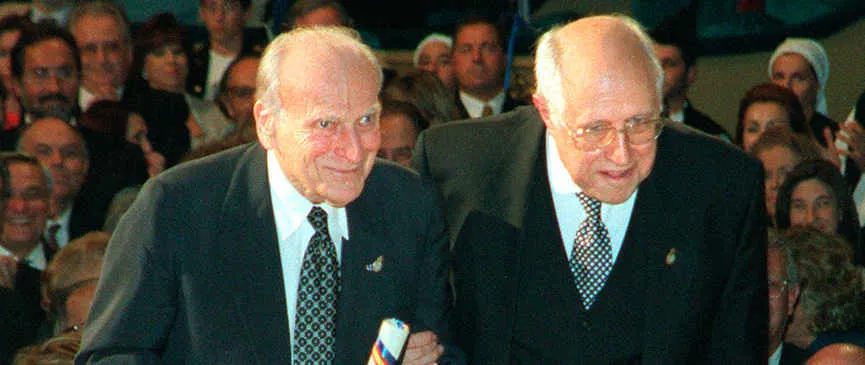Main content
Mstislav Rostropovich and Yehudi Menuhin Prince of Asturias Award for Concord 1997

Their greatest contributions to freedom, defending the rights of the weak.
Through their personal commitment, Yehudi Menuhin and Mstislav Rostropovich made major contributions to freedom and the defence of the rights of the weak and of the most noble causes.
Mstislav Leopoldovich Rostropovich (Baku, Azerbaijan, 1927 - Moscow, Russia, 2007) is internationally regarded as the twentieth-century’s most brilliant virtuoso of the cello. In addition to his musical career, he also stood out as one of the leading defenders of human rights in the world.
After beginning his musical training at the age of four, he enrolled in the Moscow Conservatory at eight years of age and gave his first concert at fifteen. As a result of the Soviet intervention in Czechoslovakia in 1968, he came into contact with Russian writer and historian Aleksander Solzhenitsyn, whom he subsequently supported both morally and financially. He became a defender of human rights in his country and, as a consequence, became the object of persecution. Distinguished with the International League’s Award for Human Rights in 1974, that same year he vowed never to play again in his country until there was complete artistic freedom, for which he and his wife, Russian soprano singer Galina Vishnevskaya, were stripped of their Soviet citizenship in 1978. Once settled in the United States, Rostropovich was appointed conductor of the Washington National Symphony Orchestra (1997-1994).
After the fall of the Berlin Wall in 1989, he conducted a peace concert in this German city. In that same year and after regaining citizenship, he returned to perform in his country in a concert presided over by Raisa Gorbachev and HM Queen Sofía of Spain. In the final years of his career, Rostropovich gave an average of 30 charity concerts a year, especially in support of Moscow’s Bolshoi Theatre and the care of Russian children in a hospital that depends on the Vishnevskaya-Rostropovich Foundation.
He was distinguished with 50 honorary degrees by universities around the world, including Harvard, Yale, Princeton, Tel-Aviv and Oxford, among others. He likewise received numerous distinctions, including the Order of Merit of the Federal Republic of Germany, the Gold Medal of the Royal Philharmonic Society (1970), the Soviet Union’s Lenin Prize (1963), the annual award of the Human Rights League (1974), was named Knight Commander of the Most Excellent Order of the British Empire (1987), and received the Praemium Imperiale for Music awarded by the Japan Association of Arts (1993). He was appointed a Commander by Number of the Royal Order of Charles III of Spain in 2004 and was awarded the Russian Order of Merit in 2007. He was also a UNESCO Goodwill Ambassador.
He passed away on 27th April 2007 in Moscow.
Yehudi Menuhin –also known as Lord Menuhin– was born in New York in 1916. The son of Jewish emigrants from Russia, he obtained British citizenship in 1985. He revealed himself as a prodigious violinist at an extremely early age, and gave his first public concert in San Francisco when he was only five years old. Student of some of the foremost maestros of the violin, he debuted in Paris at the age of ten, in New York at the age of eleven, and shortly thereafter in Berlin in 1929. In 1934, he refused to visit to Germany on the grounds of his Jewishness, while requesting that the exile of other Jewish musicians be annulled, and in 1935 undertook his first world tour, giving 110 concerts in 72 cities. During World War II, he gave more than 500 concerts for the Red Cross and the Allied Forces. In 1945, he participated in the UN inauguration concert in San Francisco. After the war, he performed in Germany in 1947 and in Moscow in 1950, and was responsible for the intercultural exchange programme between the United States and the USSR in 1955.
In addition to his career as a violinist, he subsequently also conducted orchestras. Moreover, he made a significant contribution to the growth of the teaching of music through the creation of two important schools in Great Britain and Switzerland. A prominent human rights activist, he gave charitable concerts across the world in support of numerous causes and, in 1992, was named a Goodwill Ambassador for UNESCO, whose International Music Council he had previously chaired (1969-1975). Lord Yehudi Menuhin was also known for his collection of more than 30 violins, as well as for his books The Violin, The Music of Man, Violin and Viola, among others. Holder of the Jawaharlal Nehru Award (1968), the Gold Medal from Spain’s General Association of Authors and Editors (1995) and Spain’s Cross of Civil Merit (1995), among many other honours and distinctions, he has also received honorary degrees from more than thirty universities, including the Universities of Oxford and Cambridge (UK), the Sorbonne (France) and Toronto (Canada).
He passed away in Berlin on 12th March 1999.
End of main content
